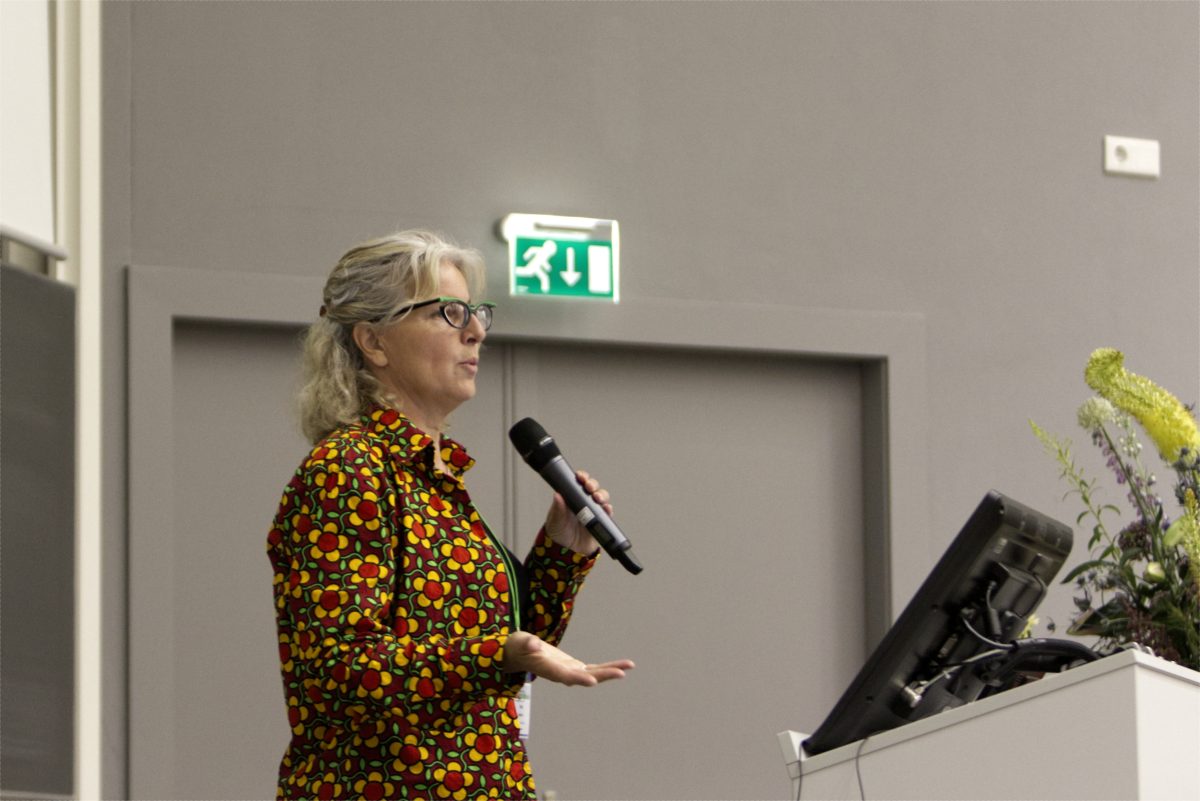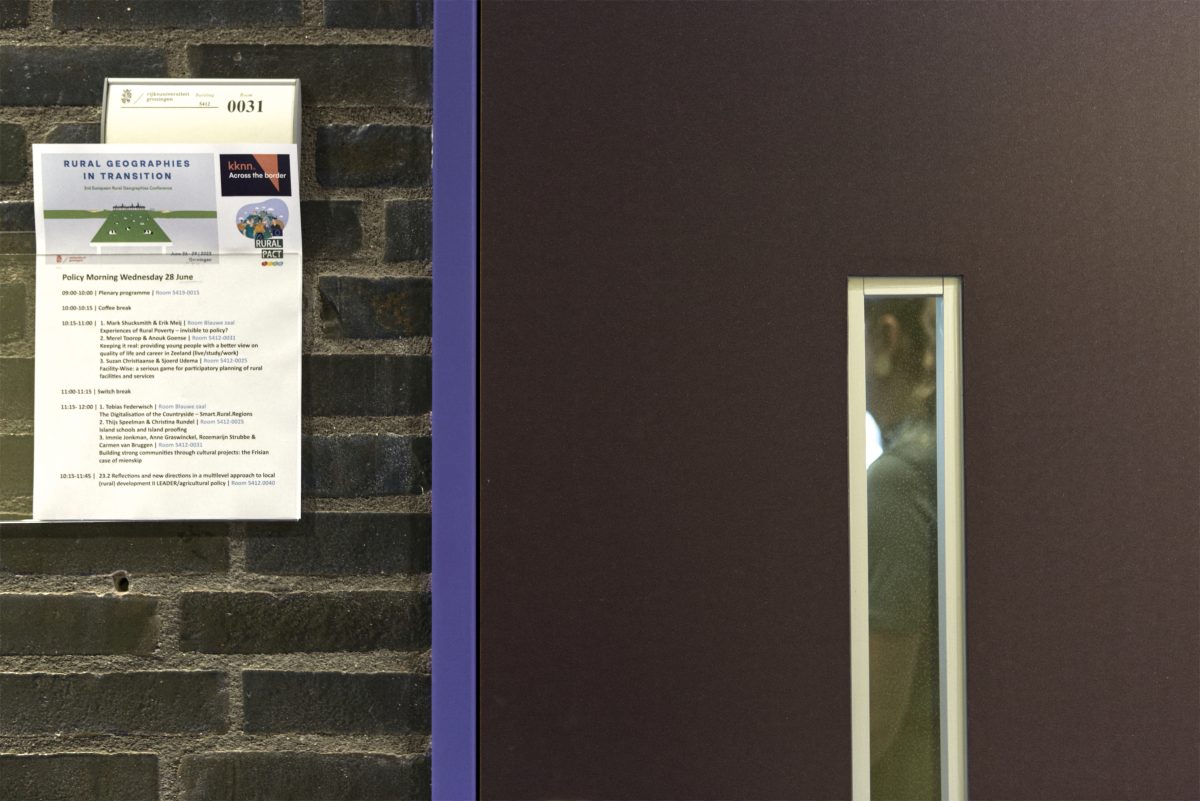From 26 till 29 june the Faculty of Spatial Sciences of the University of Groningen organised the 3rd Rural Geo conference. On wednesday 28 june there was a spcial policy morning together with the KKNN. Pictures are taken by Harma Kaput.
 Professor Tialda Haartsen
Professor Tialda Haartsen
After an introduction by organizing Professor Tialda Haartsen of the University of Groningen and Johan Woltjer, the dean of the Faculty of Spatial Sciences, the policy morning kicks off with a presentation by Johan Osinga, Director General of the Dutch Ministry of Agriculture, Nature and Food Quality. In his talk he highlights some of the numerous challenges which face the Dutch countryside, and society in general.
He is glad to see so many scientists and students in the lecture hall because science plays a vital part in the policy making process.
The most important challenges the Dutch countryside face are a sustainable food system, the protection of biodiversity and sufficient and clean water for us, but also for generations to come. Osinga, who has Frisian countryside roots, stresses the importance of co-creating, learning, and experimenting. These challenges must be tackled step by step, as knowledge is built along the way.
The National Rural Areas Programme is created to address several problems at once with an integrated approach. It is a joint quest with input from locals and people in the field, farmers, scientists, and nature conservationists. Goals are to create a sustainable future-proof Dutch countryside and tackle challenges regarding nature, nitrogen, clean water, and climate goals. Because the Dutch countryside consists of multiple landscapes and different types of soil, there is no one size fits all solution. Different areas require different approaches. By co-creating and learning from each other, local actors can build on the knowledge to integrate area-oriented approaches to address and solve specific problems.
As Director General of the Transition of Rural Areas, Osinga leads a fast-growing organization that supports national and provincial governments in their contribution to the transition of rural areas by strengthening the implementation capacity. This is done by creating the Transition School for Rural Areas and a Young Professionals Programme, in which learning together and exchanging experiences between all actors involved is key.
The future perspective for farmers is another major challenge in the coming decades. Talking to farmers is vital, as not only the economical component is important but also the emotional issues must be addressed as their family businesses face challenging times. How do we create a sustainable agricultural sector in 2040? And how is this financed? Solutions must be found. We are in this together, but it has proven difficult to come to an agreement.
The great divide between rural and urban areas has grown. The government seemed to pay more attention to urban areas, as rural areas impoverished. Not only nature, biodiversity, water, and climate matter, but the socio-economic challenges are significant as well.
The Dutch countryside changes fast and a re-evaluation of the rural areas is necessary. We must search for a renewed geography of the countryside. The knowledge from scientists, people in the field, farmers and policy makers combined offers insight in how to tackle these great challenges that face the Dutch countryside.
EU Long Term Vision & Rural Pact
For the coming years, the countryside is one of the main focus areas of the European Commission (EC). In 2019, EC President Von der Leyen acknowledged Europe’s “rural areas” as the very “fabric of our society and the heartbeat of our economy.” In this, she recognizes their “diversity of landscape, culture and heritage” as “one of Europe’s most defining and remarkable features,” and “a core part of our identity and economic potential.” This means that the EC will work hard to “cherish and preserve” Europe’s “rural areas and invest in their future.”
With that statement, EC policy coordinator Alexia Rouby introduced the long-term vision for Europe’s rural areas and the Rural Pact. With 83% of Europe being rural land where only 30% of its population lives, Rouby explains that “the countryside has a lot of potential, especially in the green transition” that we’re in the middle of. The rural vision revolves around 4 areas of action to achieve by 2040:
- Stronger: to empower communities so they can design their own future, innovate society and have access to services
- Connected: to improve mobility and digital connectivity
- Prosperous: to diversify the economy and create sustainable food productions
- Resilient: to increase resilience to climate change and environmental challenges while fostering social development.
A voice for the countryside
These areas of action have been translated in 10 shared goals that “came from an innovative bottom-up process that makes them impossible to work with,” Rouby jokes. However, rural areas throughout Europe are very diverse; just think of the Spanish mainland compared to the Greek Islands or the Groningen countryside.
It is therefore essential that the various rural areas voice their unique challenges themselves and, Rouby emphasizes, that “all ministry levels work on this, and work together”. One result of the long-term vision is improved data availability on rural areas so that policymakers all the way up to the European level can get insight into its specifics.
Rural Pact
Another result is the Rural Pact, a cooperation between national, regional and local governments, civil society organisations, businesses, academics and citizens to act towards the shared goals of the rural vision. In effect, the pact amplifies the voice of rural areas to bring them up in policy agendas and facilitates networking, collaboration and mutual learning. Finally, “it’s not just about networking,” Rouby emphasizes. “It’s about making policy achieving change” and therefore the pact involves making commitments to act where “everyone can help and every gesture can matter”.
When Rouby finished, it was clear that in order to achieve real policy change for Europe’s rural areas, young citizens need to join the vision as well. It was therefore fitting that her presentation was followed by professor in rural geography and this year’s Rural Geo host Thialda Haartsen, who presented her new master programme “Sustainable Rural Futures” that will launch next academic year in September.
Rural Pact support office: networking, evaluate the rural pact community, build synergies with networks and government and support its work, facility services for the rural pact community,
More about EU’s Rurla Vision on: https://rural-vision.europa.eu/
Interested in joining the Rural Pact? https://ec.europa.eu/eusurvey/runner/ruralpact
